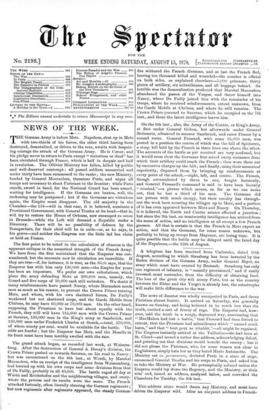The first point to be noted in the calculation of
chances is the apparent collapse in the numerical strength of the French Army. We have from the first maintained that the Emperor was out- numbered, but the accounts now in circulation are incredible. If they are true—if, for instance, it is true, as the Siècle says, that the Emperor has with him only 130,000 men—the Empire for years has been an imposture. We prefer our own calculations, which place the army defending Metz at 200,000 men, namely, the Guard and five corps of 30,000 each still unbroken. We doubt if many reinforcements have passed Nancy, where Macmahon needs men as much as his master, to prevent the Crown Prince turning Metz, and where, with his own shattered forces, De Failly's weakened but not shattered corps, and the Garde Mobile from Chalons, he may have 60,000 or 70,000 men. On the other hand, supposing the Prussians to have lost about equally with the French, they still will have 115,000 men with the Crown Prince at Saverne, 130,000 men in the King's army at Saarbriick, and 130,000 men under Frederick Charles at Sierck,—total, 370,000, of whom ninety per cent, would be available for the battle. The odds are fearful ; but the Emperor has Metz, and the Moselle in its front must have been terribly swelled with the rain.






























